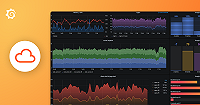Important: This documentation is about an older version. It's relevant only to the release noted, many of the features and functions have been updated or replaced. Please view the current version.
Troubleshoot eBPF installation
Learn how to troubleshoot and resolve eBPF installation issues.
Profile interpreted languages
Profiling interpreted languages like Ruby, JavaScript, etc., is not ideal using this implementation. The JIT-compiled methods in these languages are typically not in ELF file format, demanding additional steps for profiling. For instance, using perf-map-agent and enabling frame pointers for Java.
Interpreted methods will display the interpreter function’s name rather than the actual function.
Troubleshoot unknown symbols
Symbols are extracted from various sources, including:
- The
.symtaband.dynsymsections in the ELF file. - The
.symtaband.dynsymsections in the debug ELF file. - The
.gopclntabsection in Go language ELF files.
The search for debug files follows gdb algorithm.
For example, if the profiler wants to find the debug file
for /lib/x86_64-linux-gnu/libc.so.6
with a .gnu_debuglink set to libc.so.6.debug and a build ID 0123456789abcdef. The following paths are examined:
/usr/lib/debug/.build-id/01/0123456789abcdef.debug/lib/x86_64-linux-gnu/libc.so.6.debug/lib/x86_64-linux-gnu/.debug/libc.so.6.debug/usr/lib/debug/lib/x86_64-linux-gnu/libc.so.6.debug
Deal with unknown symbols
Unknown symbols in the profiles you’ve collected indicate that the profiler couldn’t access an ELF file associated with a given address in the trace.
This can occur for several reasons:
- The process has terminated, making the ELF file inaccessible.
- The ELF file is either corrupted or not recognized as an ELF file.
- There is no corresponding ELF file entry in
/proc/pid/mapsfor the address in the stack trace.
Address unresolved symbols
If you only see module names (e.g., /lib/x86_64-linux-gnu/libc.so.6) without corresponding function names, this
indicates that the symbols couldn’t be mapped to their respective function names.
This can occur for several reasons:
- The binary has been stripped, leaving no
.symtab,.dynsym, or.gopclntabsections in the ELF file. - The debug file is missing or could not be located.
To fix this for your binaries, ensure that they are either not stripped or that you have separate debug files available. You can achieve this by running:
objcopy --only-keep-debug elf elf.debug
strip elf -o elf.stripped
objcopy --add-gnu-debuglink=elf.debug elf.stripped elf.debuglinkFor system libraries, ensure that debug symbols are installed. On Ubuntu, for example, you can install debug symbols
for libc by executing:
apt install libc6-dbgUnderstand flat stack traces
If your profiles show many shallow stack traces, typically 1-2 frames deep, your binary might have been compiled without frame pointers.
To compile your code with frame pointers, include the -fno-omit-frame-pointer flag in your compiler options.


